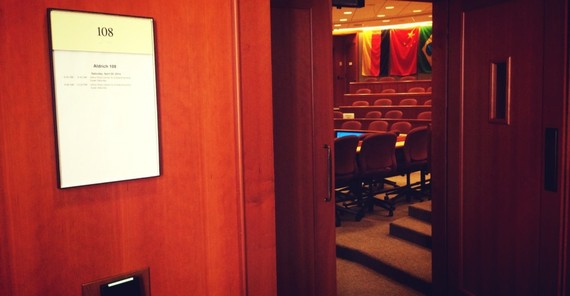"When your time comes and a thousand different voices tell you that you are not ready for it, listen instead to that lone voice of dissent, the one that says -- you are ready, you are prepared." -- Nike
"Are you ready?" It was 9:30am on a Saturday morning. I paused for a moment. Then I walked through the door. Six judges were waiting to hear my fifteen minute pitch.
I had barely slept the night before. Minutes earlier I walked across the Charles River. I felt nervous. But that's good, I said to myself. Entertainers are nervous before they perform. It's embracing the fear and doing it anyway that matters.
Then I walked through the door and started my presentation. A few minutes in, one of the judges interrupted: "I disagree with your assumptions." I answered calmly and marched on. I stayed in the moment. I wasn't nervous anymore.
Flashback a week earlier: our team had doubts whether or not we should enter the competition. We did not feel prepared. We did not feel ready. It was merely a project.
Granted, there are certain situations where sitting and waiting might be better. But looking back it was better to pitch than not to pitch.
Every day we are given opportunities to pitch -- to a future friend, girlfriend, job or boss. When we are in the moment, it is easy to listen to those thousand different voices, and not pitch. But pitching on a regular basis is so important.
Let me tell you why...
1. Stretch your comfort zone
There are hidden opportunities every day. Pitching is a means to uncover them. It could be seeing a woman walking down the street. She is beautiful. You are attracted to her. But you don't approach her. You tell yourself why you can't do it. And then the moment passes. For the rest of the day you regret the decision. And yes -- not acting is a decision, albeit a passive one.
"It's like seeing someone for the first time... like you could be passing on the street, and you look at each other and for a few seconds... there's this kind of a recognition... like you both know something. The next moment, the person's gone, and it's too late to do anything about it. And you always remember it, because it was there, and you let it go, and you think to yourself, "What if I had stopped? If I had said something?" -- George Clooney, Out of Sight
But if you did approach her -- even if she is mean to you -- you will not feel that way. It goes back to the old fight-or-flight response. Fight and stretch your existing comfort zone, step by step, or flight.
2. Feedback is critical
"Insanity: doing the same thing over and over again and expecting different results." -- Albert Einstein
The feedback that we received days after the pitch was bad. It was almost discouraging. But that doesn't matter. Even if your pitch fails, feedback is crucial. Feedback helps you to recognize new patterns to do things.
If you don't pitch, however, there is no feedback. Without feedback, you go in circles. You don't learn. You don't learn what Tim Ferriss calls the "Minimim Viable Dose", the 20% that will give you 80% of the output.
3. Fail quickly
Obviously you want to learn quickly, and maximize your chances of success. But not everything you do will work. Certainly not the first time you do it. But if you avoid pitching, you just delay (temporary) failure. Yet failure is necessary to become successful.
If you don't feel ready, or prepared, invoke the Nike ad that suggests that "when your time comes and a thousand different voices tell you that you are not ready for it, listen instead to that lone voice of dissent, the one that says -- you are ready, you are prepared."
This piece was originally published on Medium.

